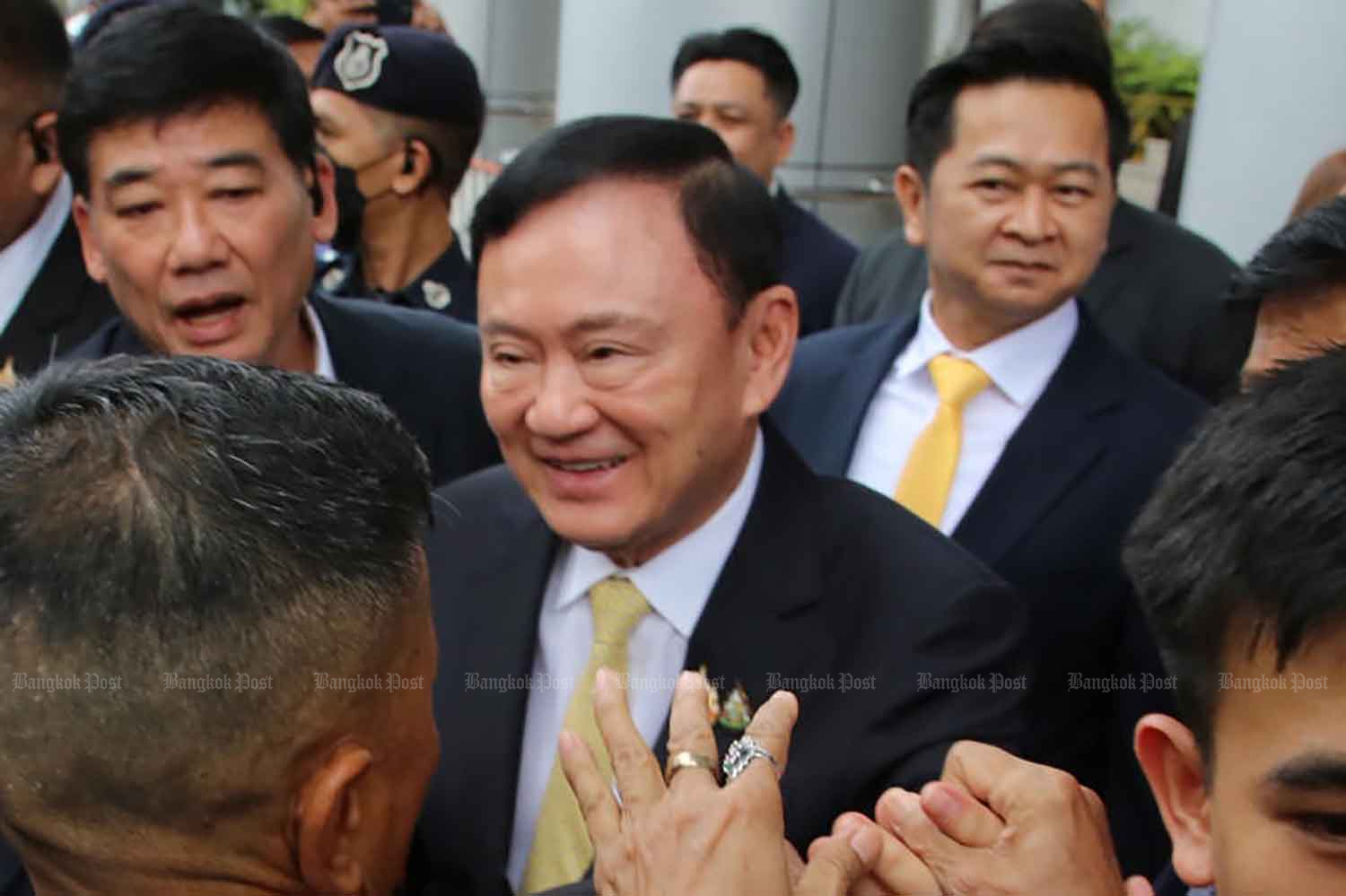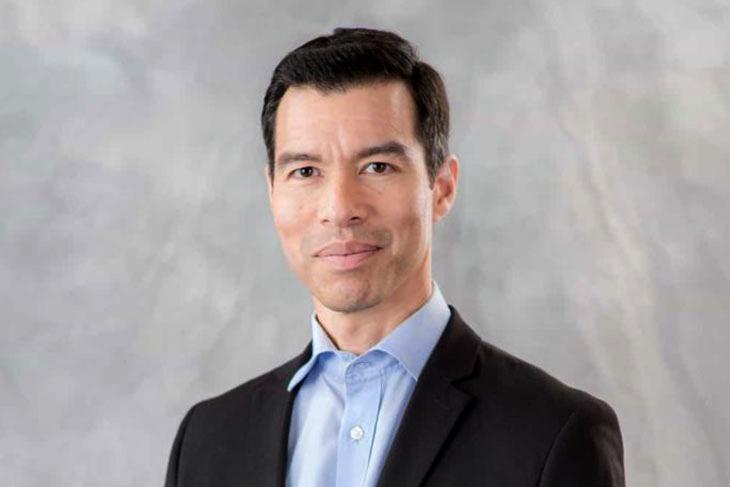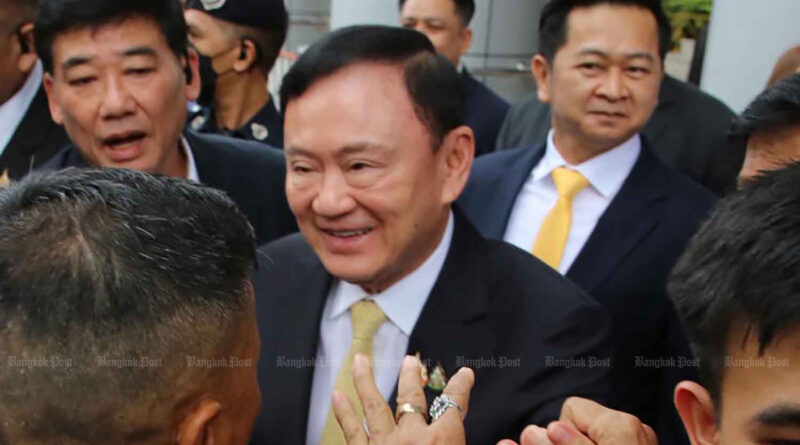Jail scenarios for former Thai PM Thaksin in hospital saga

A legal expert has outlined scenarios suggesting former prime minister Thaksin Shinawatra may face a prison term in the so-called “14th floor” hospital case, if his royal pardon request is deemed to be fraudulent.
On Tuesday, the Supreme Court’s Criminal Division for Holders of Political Positions is set to rule on a high-profile case involving Thaksin’s six-month stay on the 14th floor of the Police General Hospital (PGH), where he served his prison sentence in a premium ward.
The case has stirred public criticism, with many alleging Thaksin feigned or exaggerated illness to avoid being incarcerated in a regular prison facility. Thaksin, 76, returned to the country on Aug 22, 2023, after more than 15 years of self-exile abroad.
He was sentenced to eight years in prison in three cases — later reduced to one year by royal clemency — for abuse of authority and conflict of interest while serving as prime minister prior to 2006.
On Aug 22, his first night in custody, the Department of Corrections, citing his serious health issues, transferred Thaksin to the PGH, where he remained until he was granted parole in February last year, a move which prompted public questions over whether he had received special treatment.
Speculation is now mounting over whether Thaksin will return to Thailand to hear the court’s ruling on Tuesday, after his sudden diversion from Singapore to Dubai reignited criticism and suspicion among political opponents and commentators.
Thaksin, who left Thailand Thursday evening, claimed he was travelling for medical treatment in Singapore. He later announced via social media that his flight had been rerouted to Dubai because of delays at Thai immigration and the closing hours of Singapore’s Seletar Airport. He insisted he intends to return on Monday ahead of the ruling.
Possible scenarios
Jade Donavanik, a legal scholar and president of the College of Asian Scholars’ Faculty of Law, told the Bangkok Post there are several plausible scenarios. The first is the court may determine the sentence has already been enforced. If so, the case would be considered closed.
However, Mr Jade noted that if the court finds the sentence was not properly enforced, the focus will shift to what extent Thaksin’s sentence remains unserved. “It could be one full year, six months, or some other duration — this will depend on the court’s interpretation,” he said.
A critical issue, Mr Jade said, is whether Thaksin’s sentence was not enforced due to fraudulent claims made in his petition for royal clemency.
“If the court views that Thaksin provided false information in his petition for royal pardon and the royal command is subsequently revoked, the original eight-year sentence could be reinstated,” he said. “In that case, anything remains possible.
“I believe Thaksin’s sentence has not been enforced. If the court agrees, he will need to serve at least one year — the reduced term,” Mr Jade said. “Whether the pardon can be revoked is a matter of royal discretion.”
He said that if Thaksin is ordered to return to prison, he will no longer be able to manoeuvre for leniency or serve his sentence at home or in hospital. “Exemptions like sentence suspension or alternative custody are typically allowed only for extreme old age, but Thaksin no longer qualifies under other criteria. He appears healthy and capable of travelling internationally. There’s no longer any indication of serious illness.”

Jade: Royal petition scrutiny
Repercussions
Mr Jade said that if the court rules Thaksin’s sentence was not properly enforced, the civil servants involved — including the hospital director, doctors, and nurses involved — could also face legal consequences.
He said criminal liability would apply according to each individual’s role and level of involvement. The primary charges would likely fall under Section 157 of the Criminal Code, relating to dereliction of duty or misconduct in office. Additional charges would depend on a case-by-case review of each person’s responsibilities and actions.
As for the political impact, Mr Jade believes the ruling is unlikely to directly affect the broader political landscape. However, it could shake up the Pheu Thai Party. If Thaksin — seen as the party’s spiritual leader — is ordered back to prison, especially on the grounds of submitting false information in his royal pardon request leading to its revocation, the fallout could be substantial for the party’s image and internal cohesion.
Slim chances
Wanwichit Boonprong, a lecturer at Rangsit University’s faculty of political science, said the likelihood of Thaksin escaping the so-called “14th floor case” is very slim.
While those who assisted him — including corrections officers, doctors, and nurses — are clearly at fault, the key issue for Thaksin is whether he will be required to return to prison.
“The real question,” he said, “is whether the sentence will be enforced and whether Thaksin must go back to jail.” He said initial wrongdoing involved conflicting accounts from officials in the Department of Corrections, as well as medical personnel, which ultimately did not support Thaksin’s case.
These inconsistencies have made the court’s review noteworthy, especially considering Thaksin’s sentence had been reduced to one year through a royal pardon.
The question now is whether that sentence has, in fact, been properly served. “I believe there is a high chance the court ruling will not favour Thaksin,” Mr Wanwichit said. “If the court finds wrongdoing, it’s possible that he will be ordered to serve the remainder of his sentence in prison.”
Mr Wanwichit added that if Thaksin personally appears in court on the day the verdict is handed down, it would reflect Thaksin’s mental resolve and a willingness to accept the outcome.
“It would mean he’s ready to surrender, to bring closure — no more legal fights,” he said. Such a gesture could earn him sympathy or renewed support from those who still admire him or remain loyal to the Pheu Thai Party. As for state officials involved in the case, Mr Wanwichit noted that if they are found guilty, they will face criminal penalties — primarily imprisonment.

Wanwichit: Escape from case unlikely
Source – Bangkok News




